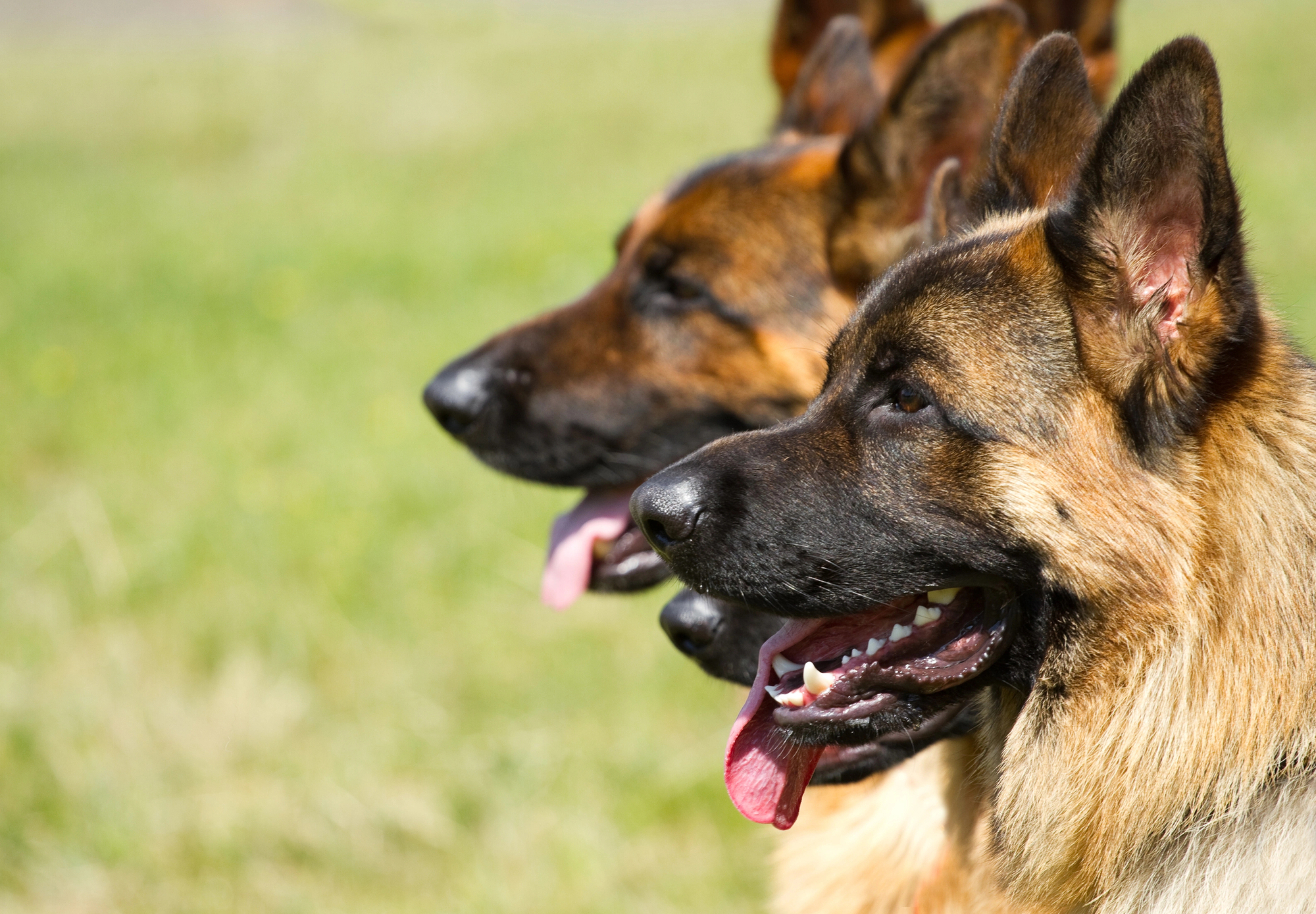Dobermans and German Shepherds are both known for their protective nature and formidable strength. Because of this, they are both common choices for guard and protection work. If you’re trying to choose between German Shepherds vs Dobermans, how do you decide which breed is best for you? Learn about how the two breeds compare so you can make the right choice for you.
Breed Overview: German Shepherd and Doberman
The more you know about Doberman vs German Shepherd breeds, the easier it will be for you to choose which is right for your home. Here’s an overview of how these breeds compare.
German Shepherd
German Shepherds are noble, loyal, fearless, and perhaps the most adaptable working dog breed there is. Originally bred to herd sheep, a German Shepherd was also the first service dog in the U.S., serving as a seeing-eye dog in 1928. This highly intelligent and motivated breed is a top choice for military and police K9s because they can move adeptly between protection work, explosive or narcotic detection, search and rescue work, and more. They are fast and graceful, and won’t hesitate to put themselves in harm’s way to protect their people. As brave and tenacious as they are in the face of a threat, they also bond closely, making them loving and dependable companions.
 Doberman
Doberman
Dobermans are strong, sleek, powerful, and impressively athletic. Originally bred to protect tax collectors, their strength and drive have since made them ideal dogs for police and military work, search and rescue work, and even service and therapy work. They’re highly intelligent and trainable, with very good intuition. They have tons of energy, so they can be pushy and hard to manage without the necessary training. However, with proper and consistent training and socialization, they are loving and joyful dogs who love spending time with their people.
Understanding Loyalty, Drive, and Behavior
As you compare German Shepherd vs Doberman, think about the traits you value most in a dog. While Dobermans and German Shepherds have quite a lot in common, there are also some distinct differences. These differences can help guide you toward the breed that’s a better match for you.
- Doberman: Dobermans are an extremely loyal breed, and they bond well with their people. They have a strong work drive and make excellent working dogs in a variety of fields. They also have a very strong prey drive, which can make them a higher risk with other pets and requires ample training and socialization to ensure they’re safe with other animals and small children. With proper training and socialization, which they take to very quickly, they are great family dogs.
- German Shepherd: German Shepherds are also an extremely loyal breed that forms strong bonds, and they will vigilantly protect their people. They have a phenomenal work drive and love nothing more than having a job to do. German Shepherds have excellent control over their prey drive, so they tend to be a little more dependable around small children and animals. They do have loads of energy and need mental stimulation, so their behavior is dependent on good training and the amount of exercise and entertainment they’ve had that day.
Intelligence and Trainability
When it comes to intelligence and trainability, you’ll mostly find similarities between a Doberman vs German Shepherd. Both breeds are highly intelligent and highly trainable, so you may struggle to decide which breed suits you better. It all comes down to the training needs of each dog. Dobermans have that strong prey instinct, so their training and socialization should focus on controlling that instinct well. German Shepherds, on the other hand, may tend toward barking more than you’d like, so early training should focus on controlling and channeling that barking instinct correctly.
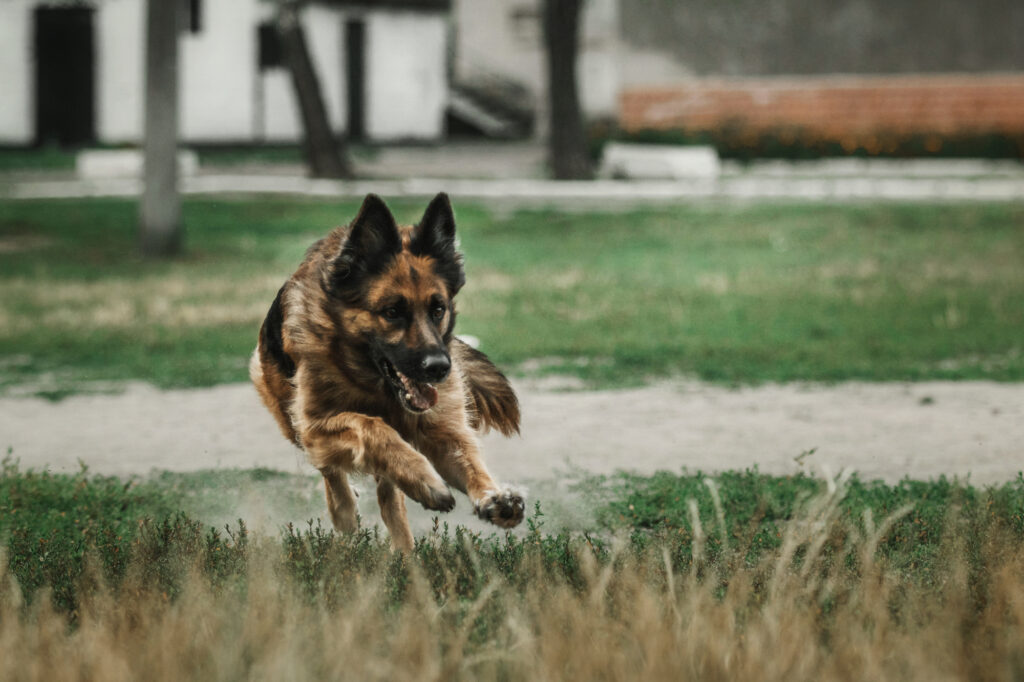
Energy, Exercise, and Stimulation Needs
In the comparison between German Shepherds vs Dobermans, you’ll once again find they are very similar in terms of their energy levels and exercise and stimulation needs. As high-energy, highly intelligent dogs, they need regular daily exercise and sufficient entertainment to maintain their good behavior. Otherwise, they can get bored and frustrated and find ways to keep themselves busy that you’re probably not going to like.
To keep either breed happy, healthy, and well-behaved, you must provide daily opportunities to expend their energy and keep them challenged and stimulated. Try choosing activities that keep both their bodies and minds working, including:
- Hiking in areas with varied terrain
- Agility courses
- Hunting or tracking
- Practicing special skills and obedience
- Swimming or diving
- Herding (of animals or family)
- Long-distance fetch
- Hide and seek (with loved ones or toys)
- Puzzle challenges
- Playing with children
- Playing with other well-trained and socialized dogs
If you’re interested in either of these breeds, be ready to commit to providing daily exercise. You’ll be much more pleased with their behavior if you do, and they’ll be significantly happier and healthier for it.
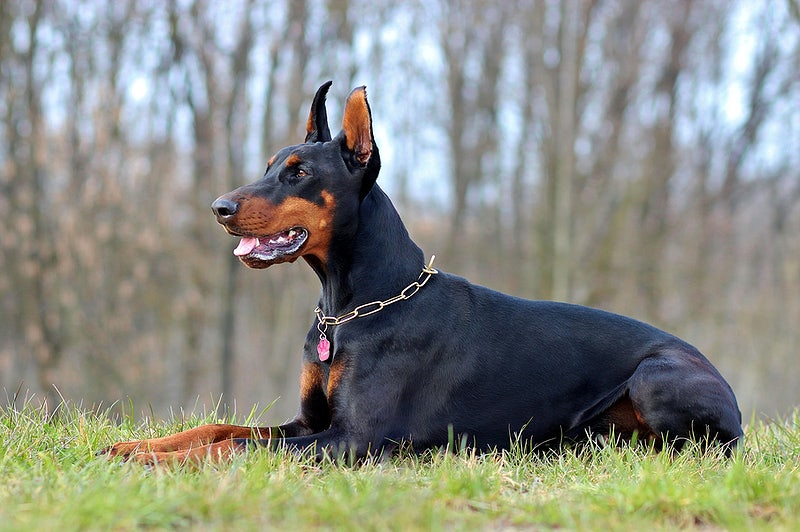
Protection Ability and Guard Instincts
When comparing Dobermans vs German Shepherds as guard dogs and protectors, both breeds exhibit strong natural protective instincts. However, you’ll find some differences in their skill sets. Take a closer look at how Dobermans vs German Shepherds compare to determine which breed’s unique qualities best suit your needs.
- German Shepherds: German Shepherds were originally sheep herding dogs, and their double-layer coat makes them highly adaptable to various environmental conditions. They are brave, confident, and willing to do anything to protect those they love, making them phenomenal protection dogs. They do love barking loudly, and sometimes too much, so they will need training on when it’s appropriate to bark. However, they learn incredibly quickly and respond well to praise. German Shepherds love keeping their people company and protecting them, and they’re wonderful family dogs.
- Dobermans: Dobermans’ specialty has always been guarding. They can quickly determine when there’s a threat and guard against it. They’re a large dog at 24-28 inches tall and 60-100 pounds, so their size alone often deters trouble. Dobermans are quieter than some other natural protectors, and they don’t typically bark unless necessary. However, they also have higher natural aggression, so they need firm and careful training and socialization. They can be wary about following commands from anyone they don’t already trust, but with proper training, they are very good guard dogs.
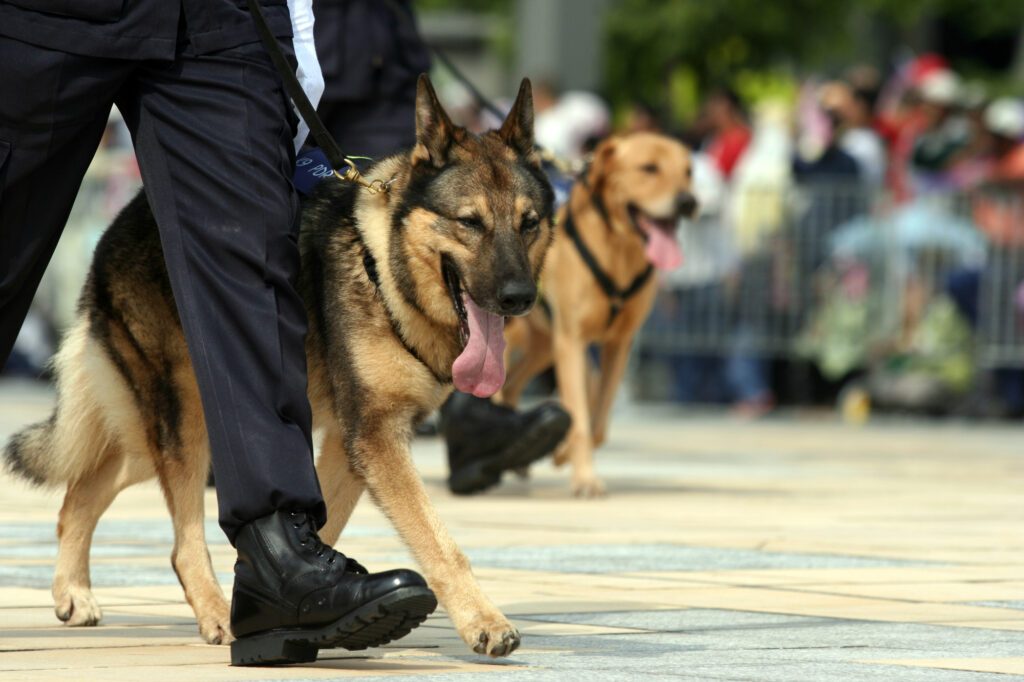
Common Health Concerns and Life Expectancy in Each Breed
Every breed has particular health concerns, and these two breeds are no different. Understanding the health concerns common to the breeds you’re interested in can help you make an informed decision and allow you to look out for these issues in the future. Here’s what to look out for in German Shepherds vs Dobermans, along with their typical life expectancy.
Doberman
- Bloat (or gastric dilation-volvulus)
- Dilated cardiomyopathy
- Hip dysplasia
- Hypothyroidism
- Progressive retinal atrophy
- Von Willebrand’s disease
- Life expectancy: 10-12 years
German Shepherd
- Bloat (or gastric dilation-volvulus)
- Degenerative myelopathy
- Heart disease
- Hip and elbow dysplasia
- Other spinal compression issues that impact the nerves
- Life expectancy: 12-14 years
The best way to prevent these health issues is to get your dog from a trusted, reputable breeder known for ensuring that their dogs are as healthy as possible.
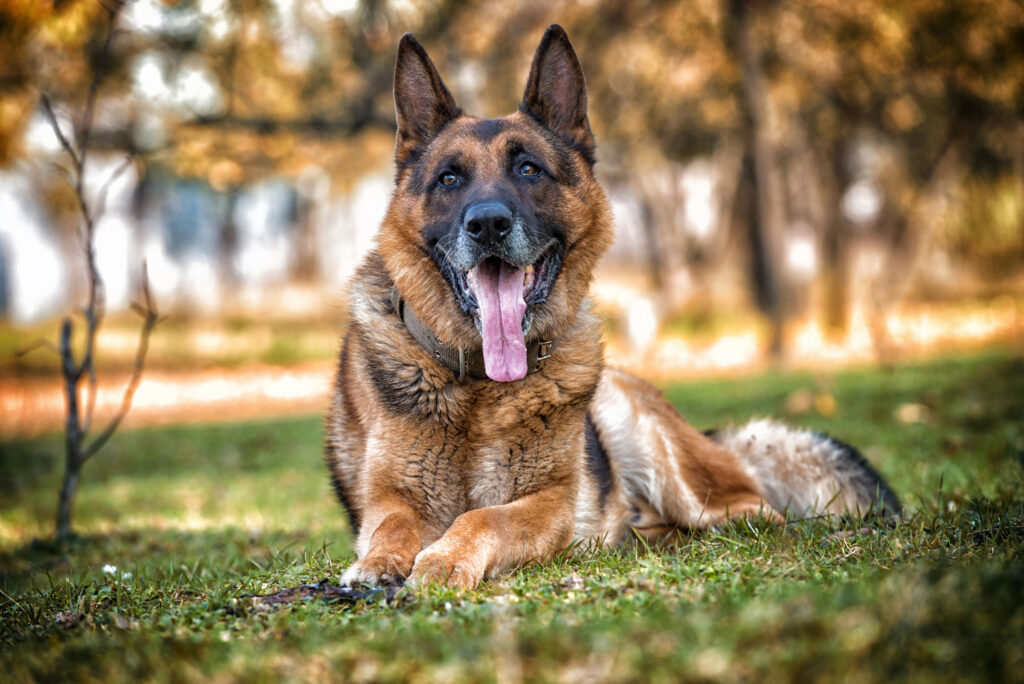
Finding the Ideal Companion for Your Lifestyle
Choosing your ideal dog isn’t always an easy decision, and when it comes to comparing Doberman vs German Shepherd, it’s frequently a close race. Both breeds are highly intelligent, naturally protective, and excellent working guard dogs. These two breeds also bond closely and love spending time with their people. Dobermans require someone who can be home a lot and spend more time reinforcing training. German Shepherds bark more, but have better control over their prey drive. Either way, neither breed is considered low maintenance, so you’re committing to spending a good amount of time, energy, and money on your dog. What you’ll get in return, however, is a lifetime of loving and loyal companionship from an incredible dog.
Sources:
https://www.akc.org/expert-advice/lifestyle/facts-about-the-doberman-pinscher/
https://www.akc.org/dog-breeds/doberman-pinscher/
https://www.akc.org/dog-breeds/german-shepherd-dog/
https://www.akc.org/expert-advice/lifestyle/fun-facts-german-shepherd/
https://www.petsradar.com/advice/German-Shepherd-vs-Doberman
https://a-z-animals.com/pets/dogs/dog-comparison/doberman-vs-german-shepherd-best-guard-dog/
https://worldanimalfoundation.org/dogs/doberman-vs-german-shepherd/
https://www.dogster.com/dog-breeds/doberman-vs-german-shepherd
